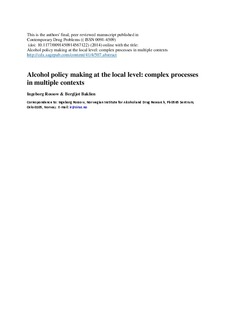| dc.description.abstract | Several effective alcohol policy measures take place at the local level, yet little is known about local policy-making processes. In Norway, on-premise closing hours are much debated, and they were subject to a liberalization wave in 2004 and a restriction wave around 2008. This study addresses the processes that underlie the changes in closing hours. We use data from 24 Norwegian cities where such changes occurred. Data include newspaper articles, city council documents, and brief interviews with key informants. Changes in on-premise closing hours were generally small. The extensions occurred when the interests of the industry were countered by other interests and arguments but only to a limited extent. The restrictions around 2008 occurred when the police frequently expressed strong concerns about the problems of violence and nuisance and recommended restrictions. The findings suggest that local alcohol policy making is formed between opposing values and competing interests. Similarities in the complex processes underlying the policy changes were found across heterogeneous local contexts. | |
